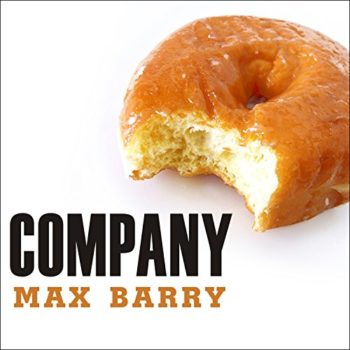As I’m sure many readers know, I use the ‘corporate world’ tag on blog posts where I discuss the business world and its oddities. For those who don’t know, check out the tag at the right (and at the bottom of this post). Over the last few months, I’ve read quite a few books – mostly fiction! – that address business world themes. Mostly criticisms of that world.
So, I hope readers enjoy hearing about some of those books. Read on for some thoughts on them!
Max Barry – Company
Sort of a popcorn novel, in the tradition of an even more slimmed down Scalzi. Though perhaps too facile at times, the book works and it’s enjoyable. The basic idea? A young man named Jones starts an entry-level position with a faceless corporation (literally – as no one has ever seen the CEO) named Zephyr Holdings. No one is sure about their actual business.
It turns out the entire company is itself a kind of fraud. I won’t say more due to spoiler issues. But the main character gets pulled into not only a company and a body of mindless corporate jargon, but the broader world of management theory and how it manipulates the company.
It’s worth a read.
Elisabeth Egan – A Window Opens
OK, so this isn’t my typical reading material. In it, a mother faces a series of crises in her life. Her husband loses his job as an attorney and develops a drinking problem. One of her kids faces bullying. Her father is dying from cancer. And she takes a promising but highly problematic job with a startup company.
The problems are all very much real. But they’re also very much the problems of a white, upper middle income family. That said, I think it’s a compelling enough book with enough to hold interest. And the book does add something to a list otherwise focused mostly on structural problems and/or the problems of white men in the corporate world.
Joshua Ferris – Then We Came to the End
Ferris takes corporate layoffs as his topic. This novel is collectively narrated by the employees of an ad agency struggling through the dot com era of the early 2000s. Layoffs hit them constantly, but they arrive in periodic drips rather than large events. And so, a climate of fear and dread hangs over all the employees.
As the book moves along and the company slowly whittles down its employee base, each employee handles the stress in their own concerning way. By the end of the book, a series of calamities hit. One person has cancer, another is pregnant, another is the father of the baby, another goes ‘postal,’ and so on.
Ferris captures the feel of a struggling office very effectively.
Rob Hart – The Warehouse
This novel follows a dystopian society where a single company – basically a futuristic version of Amazon that the author tries hard not to call Amazon – takes over nearly the entire economy. Not just the economy, but also national governments. It does so by combining the retail and delivery reach of Amazon – plus the use of drones to reach even further – with the cost-cutting skills of Walmart.
Readers probably already know the rationale the company uses to defend all this. It will, of course make the world better for consumers by offering quick delivery and low prices. Furthermore, the company involves itself in environmental issues, which have baked much of the planet by the middle of the 21st century.
It’s on that note that the two main characters enter, one who has been hired by a mystery employer as a corporate spy to take down the company.
What’s noteworthy about all this, as many reviewers have noted, is how so very plausible it all is. It doesn’t require too much of an imagination to move from Walmart and Amazon to environmental catastrophe to the kind of society Hart presents in this novel. It’s all skillfully done.
Olga Ravn – The Employees
The basic premise here is a series of reports from a workplace in the 22nd century where there was some kind of conflict between human employees and ‘humanoid’ employees (possibly robots, though never made fully explicit). While an intriguing theme, I just never got into it.
I don’t have much more to say about it than that.
Sloan Wilson – The Man in the Gray Flannel Suit
So, this book is a classic critique of 50s era middle class conformity. Wilson gives just enough content to the characters – the husband dealing with his return from World War II, the wife who makes major business moves of her own in the background, and so on – to make them interesting.
But the main lesson here is so obvious that anyone ought to be able to get it. Wilson urges the reader to adopt honestly and hard work as the best way to get out of the corporate rat race and make a good life that doesn’t depend on working 50+ hour weeks.
Is it good advice? Meh, not really. I’m sure that for some people, it would have certain psychological benefits. But it’s somehow even more individualistic and less political than the notion of ‘quiet quitting’ making the rounds as of late.
